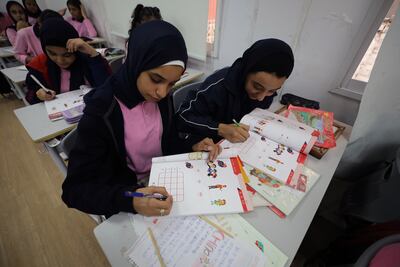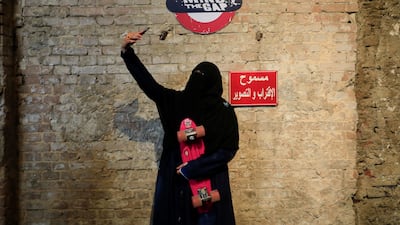A decree banning Egyptian school pupils from wearing the niqab has been met with scepticism and rejected by many parents and teachers.
Egypt’s Ministry of Education issued a decree on Monday on a unified school uniform policy, stipulating that all pupils must wear the same clothes, with colours varying by school district.
Under the rules, girls are not allowed to wear the niqab in class, as the veil covers their face.
They are permitted to wear the hijab – as this does not cover the face – but must confirm that it is their choice to put on the headscarf, said officials.
Security inside schools was the main reason behind the ministry’s ban on niqabs, said Maysa Abou Muslim, an Education Ministry official.
Outsiders can enter Egyptian schools disguised under the niqab and commit crimes or take examinations on the behalf of other pupils, Ms Abou Muslim said.
However, the decree has been rejected by some parents, who see wearing the niqab as a religious choice rather than a school directive.
“My eldest wears the niqab and if they start enforcing this rule, I will pull her out of school. I don’t think pulling her out will affect her education much anyway,” said Nermine Hassan, 52, a mother of five whose daughter is enrolled in an all-girls school in the Greater Cairo district of Giza.
“She is a secondary student anyway, most of whom only attend private tutoring and only go to the school premises to take their exams.”
Secondary pupils in Egypt mostly rely on private tutoring centres to pass national examinations, as state schools are underfunded and lacking in resources.
A head teacher at an all-girls school in Cairo told The National that he is anticipating parents will resist the decree.
“The problem is that for girls, parents don’t really care about their education as much as boys, especially when it comes to poor families,” the head teacher said.
“If there is any issue that could hurt the girl’s modesty or her family’s reputation, many parents would rather just keep her at home until she gets married.”

Nour Sallam, 47, whose eldest daughter is a student at Cairo University, expressed doubts over whether the rule would be implemented.
She pointed to the dress code for state universities introduced last year, which she says was largely ignored by university workers.
“They announced a similar rule last year at universities. It ended up not being implemented at all,” said Ms Sallam.
“I don’t think that school administrations will be able to handle the pushback from parents on this matter.
“There are many families who would rather pull their daughters out of university than compromise her modesty.”
The dress code implemented at universities was criticised for asking female students to cover up their bodies as it stipulated that short dresses and leggings were discouraged in a bid to “teach students better conduct”.
The dress code was announced after two university students were murdered.
Some feminist activists interpreted the new dress code as blaming women for violence committed by men, as it asked women to change how they dress to protect themselves.
The code was criticised by president of the Egyptian Centre for Women's Rights, Nehad Aboul Komsan, who last year expressed concerns that it was too focused on covering women up.
Aside from the ban on niqab for girls, this week’s decree also prohibited pupils from using any books and educational materials not issued by the ministry, and also banned smartphones and smoking on school premises.
Additionally, the ministry has prohibited the use of school walls to display any artwork or text of a political, partisan or religious nature.
Homework for kindergarten pupils was also prohibited by the ministry.


